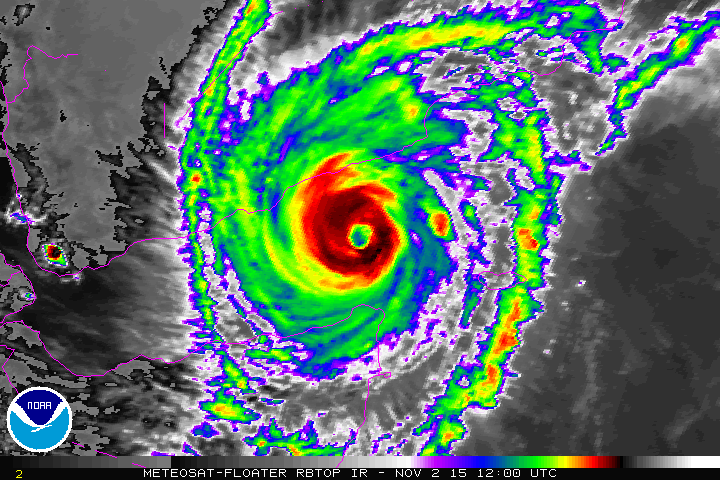Cyclone Chapala: Rare tropical storm makes landfall over Yemen, killing three

A rare tropical cyclone has made landfall over Yemen, bringing strong winds and heavy rain that have killed three and injured many so far. Forecasters have warned that Cyclone Chapala is the strongest cyclone on record to enter the Gulf of Aden and could be the strongest to make landfall over Yemen.
The cyclone slammed into Yemen on Tuesday (3 November) and brought severe flooding to the southern regions, forcing many to flee their homes. The three deaths were reportedly seen when Chapala hit the tropical island of Socotra.
The World Meteorological Organization (WMO) initially described Chapala as "an extremely severe cyclonic storm", but they downgraded the warning to "very severe" one day before Chapala made landfall in Yemen, with sustained wind speeds of 150-160kmp (93-100mph).
A spokesperson for the WMO said: "The most serious impacts are expected from the very heavy anticipated rainfall in the next four to five days. The region is climatically very arid. There is a fear that the storm will trigger significant flooding and related severe impacts such as mudslides and infrastructural damages."
Despite weakening, the Met Office has said that Chapala could issue up to ten years' worth of rain in just two days, with several hundred millimetres of rain likely. The effects of the cyclone are expected to be most severe in Shabwa and Hadramout, which hosts more than 100,000 internally displaced people due to the country's ongoing war. The World Health Organisation has delivered trauma kits for 1,000 patients in Mukalla (Hadramout), a city run by Al Qaeda militants since government institutions withdrew in April this year.
"WHO, health partners and health authorities are on high alert to ensure preparedness measures are in place and provide a timely response," said Dr Ahmed Shadoul, WHO representative for Yemen. "We are in regular contact with the health authorities in Mukalla and rapid response teams from the Ministry of Public Health and Population."
Meanwhile, the UK Foreign Office has warned British nationals of the risk posed by the storm and has urged anyone travelling to Yemen to monitor local weather updates. The Foreign Office has also advised against all travel to the country due to the ongoing conflict, urging British citizens to "leave immediately".
There has previously been only one Category 5 cyclone in the Arabian Sea, Cyclone Gonu in 2007, which weakened before it made landfall in Oman's capital of Muscat. Despite weakening, Gonu killed 100 people in Oman, Iran and the United Arab Emirates and caused billions of dollars' worth of damage.
Many residents took to Twitter to post images of the destruction that Chapala has begun to cause, with images portraying heavy flooding in Mukalla.
The seemingly endless destruction and flooding caused by #Chapala in Mukalla. pic.twitter.com/kEiwoQJYM6
— Iona Craig أيونا (@ionacraig) November 3, 2015My city #mukalla this morning #Chapala pic.twitter.com/xxYOdFAw3a
— Saeed Al-Batati (@saeedalBatati) November 3, 2015Flash floods in #mukalla #Chapala pic.twitter.com/54dV5wmSIQ
— Saeed Al-Batati (@saeedalBatati) November 3, 2015Wider view of where video in PT was taken in Mukalla. #Chapala pic.twitter.com/PXcfnzCbAy
— Iona Craig أيونا (@ionacraig) November 3, 2015© Copyright IBTimes 2025. All rights reserved.




















